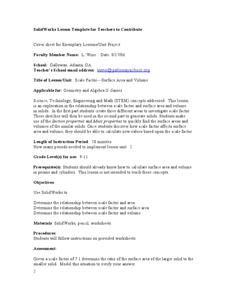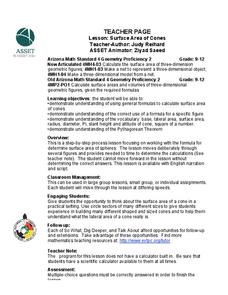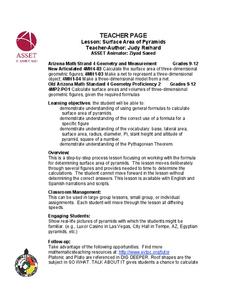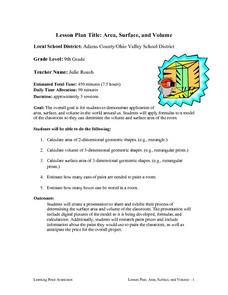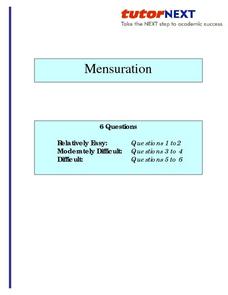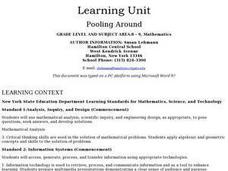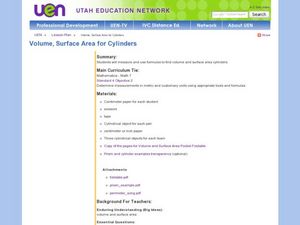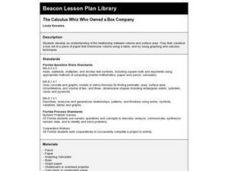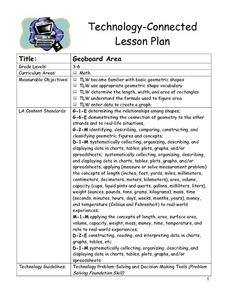Curated OER
Scale Factor- Surface Area and Volume
Young scholars calculate the surface area and volume of shapes. For this geometry lesson, students create different scales and calculate the volume and area for each shape. They compare and contrast between the different scales and shapes.
Curated OER
Surface Area of Cones
Students find the surface area of cones. In this geometry lesson, students calculate the dimensions of each three-dimensional shape and use the correct formula to solve the problem. They relate concepts of cones to the real world.
Curated OER
Surface Area of Pyramids
Students identify the surface area of pyramids and other polygons. For this geometry lesson, students find the different measurements for the different parts of a polygon. They use the surface area formula to solve for the surface...
Curated OER
Investigation-On the Surface
Students compute the surface area of 3 geometric solids to determine the shape of package that would require the least amount of paper to wrap. In this geometry activity, students work on a two-question assessment embedded in the plan....
Curated OER
Area, Surface, and Volume
Ninth graders demonstrate application of area, surface, and volume. They apply formulas to a model of the classroom so they can determine the volume and surface area of the classroom.
Curated OER
How Does Cell Size And Shape Affect Transport of Materials
Tenth graders explore concepts of surface area, volume, and ratios, create spreadsheets to aid organization of data collected and provide graphing capabilities, and use NIH Imaging to enable calculations of microscopic organisms.
Cornell University
Atomic Bonding
Explore the connection of surface area to bonding within atoms. Learners complete lab investigations to model changing surface area with different sizes and concentrations of atoms. A flour fireball demonstration follows the labs to...
Curated OER
Length, Perimeter, and Area
Students explore the concepts of length, perimeter, and area. In this math lesson, students use Shape Explorer to practice finding length, perimeter, and area.
Curated OER
ExplorA-Pond:3rd Grade Shapes & Fractions
Students, using a map, drawing or aerial view of a pond, represent the shape of the pond using simple geometric shapes or fractions of those shapes. They identify the numerator and denominator in each fraction created.
Curated OER
Mensuration: Area
In this area worksheet, pupils read story problems, draw diagrams, and find the area of described polygons. This eight page worksheet contains six problems. Answers are provided.
Curated OER
Pooling Around
Students complete a unit of lessons on computing area and volume. They play a Jeopardy game of basic area formulas, calculate surface area of shapes, develop a Powerpoint presentation, and conduct a simulation of finding the surface area...
Curated OER
Volume, Surface Area for Cylinders
Seventh graders explore the concept of volume and surface area of cylinders. In this volume and surface area of cylinders lesson, 7th graders break cylinders into their base shapes of a circle and a rectangle. Students discover that...
Curated OER
Area And Perimeter Using Pentominoes
Third graders engage in an enrichment lesson exploring the concepts of area and perimeter. They construct new pentominoes that are 3 times the size of normal ones and then identify the area and perimeter measurements. They then create a...
Curated OER
Linear, Square, and Cubic Units
Linear, square, and cubic units are all investigated as different types of packages are measured. The teacher will need supplies such as a box of aluminum foil, a package of ribbon, and a bag of mulch. The class determines the...
Curated OER
SA/V Ratio and Rate of Diffusion
Students calculate the SA/V ratio and volume of phenophthalien agar that are cut into different shapes. They then let ammonia diffuse into the various pieces of agar and determine the effect that SA/V had on the rate of diffusion.
Curated OER
Cut It Out!
Learners calculate the surface area of polygons. In this geometry lesson, students use spacial reasoning to find the answer to their problem. They analyze solids and create formulas to estimate the measurements of the area.
Curated OER
Bubbles Everywhere!
Eighth graders use concrete and graphic models to derive formulas for finding perimeter, area, surface area, circumference, and volume of two- and three-dimensional shapes. This activity is a fun way to practice measurement and circle...
Curated OER
The Calculus Whiz Who Owned a Box Company
Students use the relationship between volume and surface area to construct a box out of a piece of paper that maximizes volume using a table and by using graphing and calculus techniques.
Curated OER
Volume Of A Prism
Eighth graders investigate the concept of a prism and finding the volume. They begin the inquiry by attempting to find the surface area in order to begin the inquiry. Students are expected to apply memory for the mathematical formulas in...
Curated OER
Geometry Institute Lesson
Students practice geometry skills. In this geometry lesson, students find the surface area of cubes and prisms, identify shapes on solids, and distinguish between 2-dimensional objects and solids.
Curated OER
Geoboard Area
Students explore the basic geometric shapes and geometric shape vocabulary through the use of geoboards and virtual geoboards. They create a variety of shapes with a partner, build ten different rectangles on their geoboards, and...
Curated OER
Length, Perimeter and Area
Learners analyze characteristics and properties of two- and three-dimensional geometric shapes and develop mathematical arguments about geometric relationship
Curated OER
The Area of a Circle
Eighth graders find the circumference and diameter of several lids, show the relationship of the two measurements and derive the formula for finding the area of a circle. In this area of a circle lesson plan, 8th graders find...
Curated OER
Perimeter All Around
Students explore perimeter and area of regular and irregular polygons. They experiment with color squares and create different arrangements using the same number squares. Then they compare the area and perimeter measurements of each.
